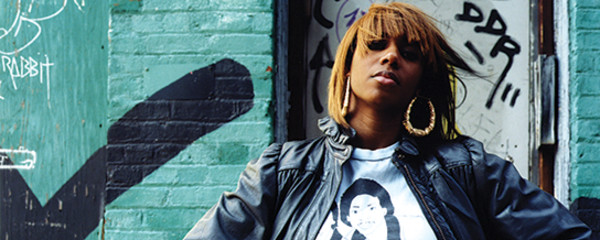Santogold: Post-Punk Peacock
Santi White’s been kicking around the realms of middle-stardom for years, working on projects that […]
Santogold: Post-Punk Peacock
Santi White’s been kicking around the realms of middle-stardom for years, working on projects that […]

Santi White’s been kicking around the realms of middle-stardom for years, working on projects that hinted at–but never realized–her full potential.
At least hers has been a fun tale to tell. Interviews have highlighted her impassioned views on racial pigeonholing in the music industry (informed by her A&R work in Sony’s urban music department) and her years fronting Philadelphia post-punk act Stiffed. She’s also got some wizard-behind-the-curtain cred: She was instrumental in writing R&B artist Res’ 2001 debut album, How I Do (MCA), and you can hear her vocals behind Lily Allen on “Littlest Things” and in the taunting refrain of Spank Rock’s “Lindsay Lohan’s Revenge.”
This year, White is unabashedly sauntering center-stage. She and former Stiffed member John Hill have formed Santogold, a project easier to define by what it isn’t than what it is. First and foremost, it’s not what record label Lizard King–an upstart led by the A&R exec who discovered The Killers–had in mind.
Initially, under the guise of an EP deal, the label paired White with pop producer Johnny “Most” Davis, who’s worked with Pink, TLC, and Diddy. “That did not work out,” laughs White, whose girlish sincerity lets her pull off even the bluntest criticisms. “It was a fight for [the label] to leave me and John [Hill] alone. I’m a fighter, so there was lots of yelling involved, and after we had a little bit of time and a little bit of space, and they heard the first demos, they left us alone for the rest of the time.”
Their debut, I Believe in Santogold, hinges its sound on reggae but teeter-totters to the extremes of new wave and heavy dub. The sinister, futuristic “Creator vs. FreqNasty” unravels as slowly as a Caribbean afternoon, moved by a single hollow, elastic drum line and the swirling repetition of the “game over” sound on your game console. Distorted ska guitar arpeggios and minor chords form the skeleton of “You’ll Find a Way,” which explodes with crisp choral riffs and explosive drum patterns.
White dips in and out of vocal styles as well. “I’m like a blend of Sister Carol and Khia–you know, from the ‘My Neck, My Back’ song,” she says, referring to the way she peacocks a haughty dancehall sing-speak (“Creator vs. FreqNasty”) one minute and a razor-sharp melodic wail (“L.E.S. Artistes”) the next.
“John [Hill] and I set out to make a record of lots of different influences,” she explains. “I get so tired of listening to records [where], by the end, you never really need to listen to it again because pretty much you listened to the same song for 14 tracks.
“In the past couple years I’ve met a bunch of artists who are moved by the same sort of creative energy,” White continues. “I’m just really excited that there are people of color making music that’s not stuck in some little box.”

